Unit 2 I think that mooncakes are delicious!Period 1(Section A 1a-2d)课件(共10张PPT)
文档属性
| 名称 | Unit 2 I think that mooncakes are delicious!Period 1(Section A 1a-2d)课件(共10张PPT) | 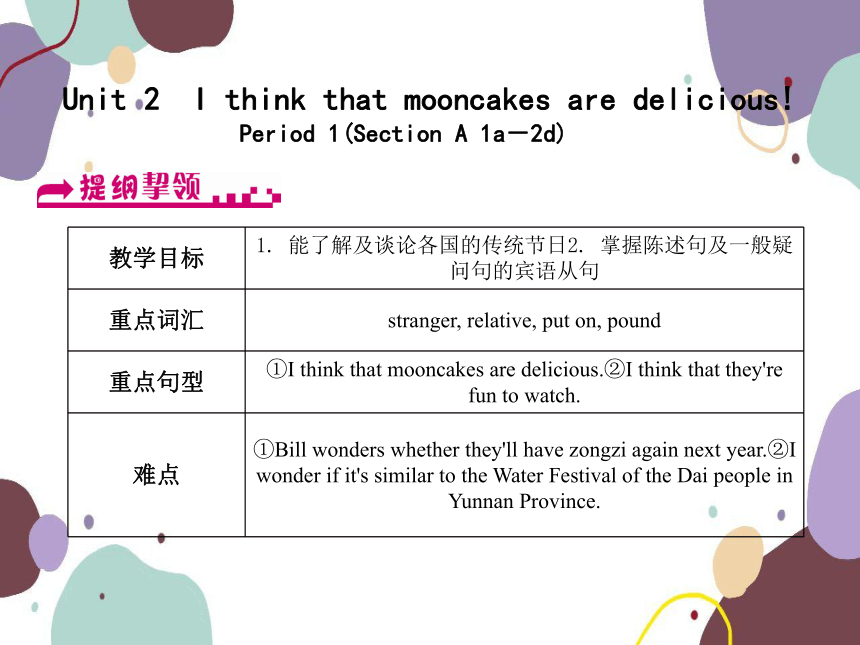 | |
| 格式 | pptx | ||
| 文件大小 | 206.8KB | ||
| 资源类型 | 教案 | ||
| 版本资源 | 人教新目标(Go for it)版 | ||
| 科目 | 英语 | ||
| 更新时间 | 2022-10-21 18:46:41 | ||
图片预览

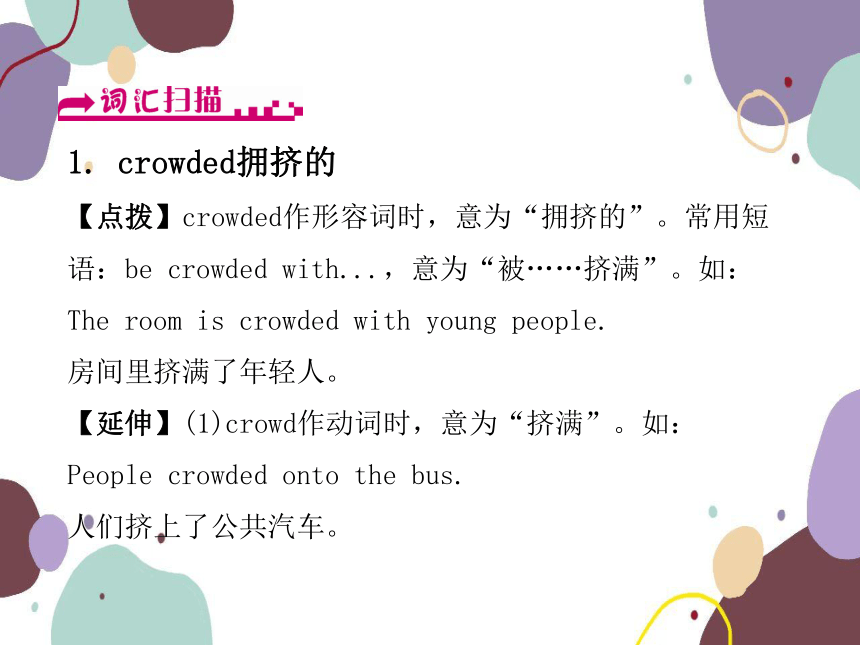
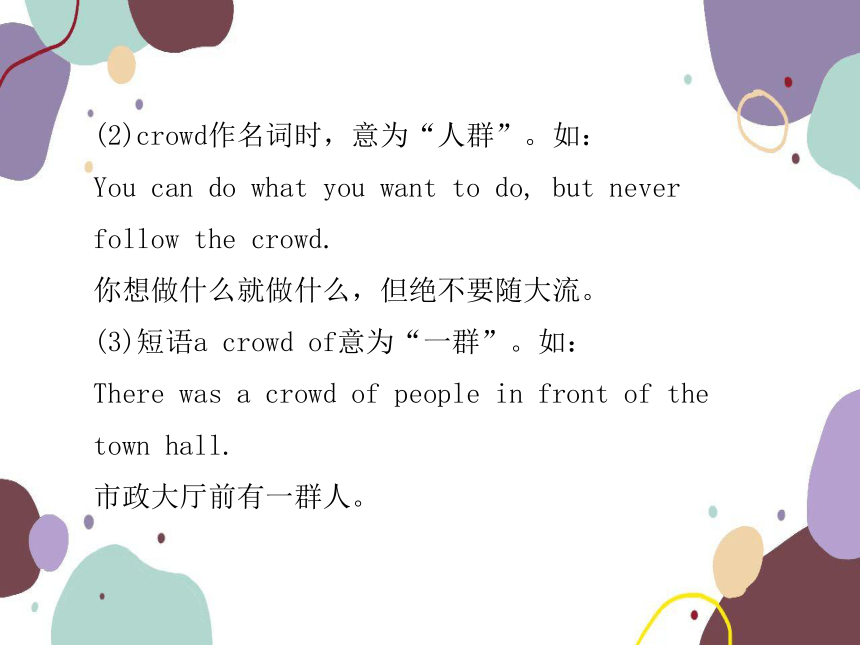
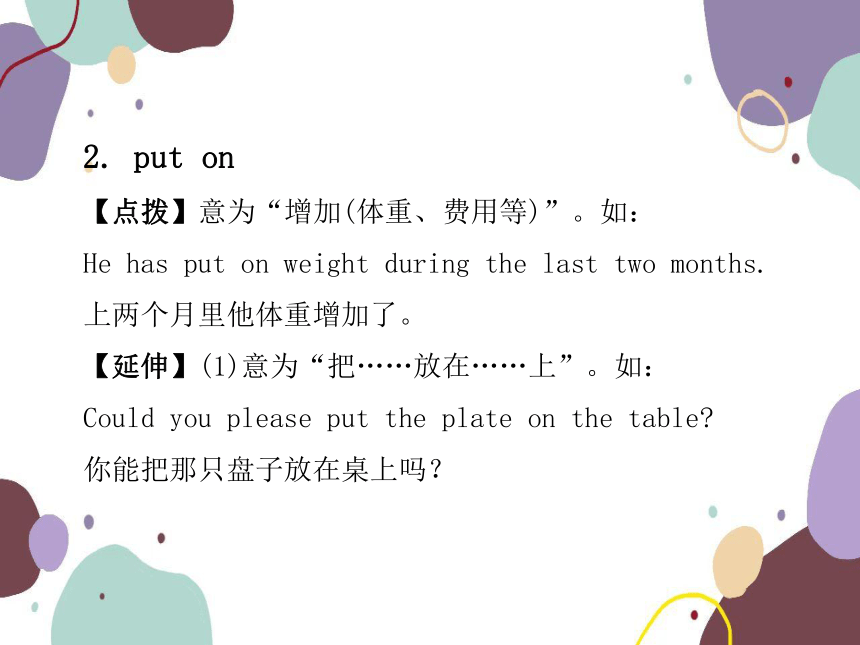
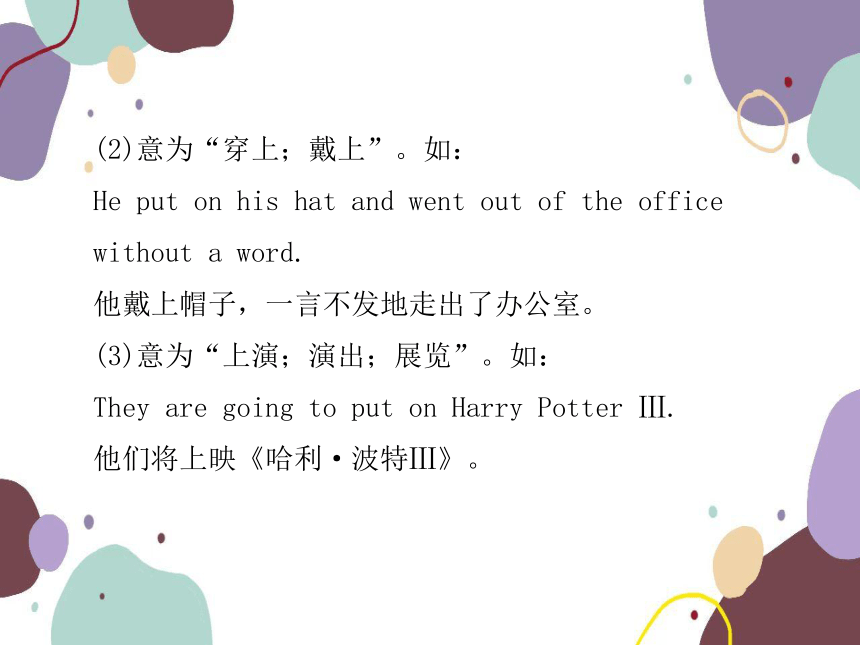
文档简介
(共10张PPT)
Unit 2 I think that mooncakes are delicious!
Period 1(Section A 1a-2d)
教学目标 1. 能了解及谈论各国的传统节日2. 掌握陈述句及一般疑问句的宾语从句
重点词汇 stranger, relative, put on, pound
重点句型 ①I think that mooncakes are delicious.②I think that they're fun to watch.
难点 ①Bill wonders whether they'll have zongzi again next year.②I wonder if it's similar to the Water Festival of the Dai people in Yunnan Province.
1. crowded拥挤的
【点拨】crowded作形容词时,意为“拥挤的”。常用短语:be crowded with...,意为“被……挤满”。如:
The room is crowded with young people.
房间里挤满了年轻人。
【延伸】(1)crowd作动词时,意为“挤满”。如:
People crowded onto the bus.
人们挤上了公共汽车。
(2)crowd作名词时,意为“人群”。如:
You can do what you want to do, but never follow the crowd.
你想做什么就做什么,但绝不要随大流。
(3)短语a crowd of意为“一群”。如:
There was a crowd of people in front of the town hall.
市政大厅前有一群人。
2. put on
【点拨】意为“增加(体重、费用等)”。如:
He has put on weight during the last two months.
上两个月里他体重增加了。
【延伸】(1)意为“把……放在……上”。如:
Could you please put the plate on the table
你能把那只盘子放在桌上吗?
(2)意为“穿上;戴上”。如:
He put on his hat and went out of the office without a word.
他戴上帽子,一言不发地走出了办公室。
(3)意为“上演;演出;展览”。如:
They are going to put on Harry Potter Ⅲ.
他们将上映《哈利·波特Ⅲ》。
3. stranger陌生人
【点拨】stranger是由strange+(e)r构成的派生词。如:
①The stranger asked me to direct him to the train station.这位陌生人问我火车站怎么走。
②Don't talk with the strangers. They may be bad men.
不要和这些陌生人讲话。他们可能是坏人。
【延伸】strange是形容词,意为“陌生的;奇怪的”。如:The boys heard the strange noise.
男孩们听到奇怪的噪音。
1. I think that they're fun to watch.
我认为观看它们很有趣。
【点拨】本句中that作为连词用来引导陈述句的宾语从句,在从句中不作句子成分,也无词汇意义,在口语中常被省略。如:
We all know (that) Lucy is a quiet girl.
我们都知道露西是个安静的女孩。
2. Bill wonders whether they'll have zongzi again next year.
比尔想知道他们明年是否还会再吃粽子。
【点拨】本句中的whether用来引导一般疑问句的宾语从句,在从句中不作句子成分,意为“是否”,在口语中多用if。如:
Helen doesn't know if/whether Robert is still in New York.
海伦不知道罗伯特是否还在纽约。
【延伸】一般情况下,if和whether可以互换,但以下情况只能用whether:
(1)在不定式前。如:
Whether to go there or not hasn't been decided.是否去那里还没决定。
(2)在介词后(介词往往可以省略)。如:
It depends (on) whether it is going to rain.
那取决于天是否会下雨。
(3)与or not连用时。如:
They are talking about whether to go there or not.他们正在讨论是否去那里。
3. I wonder if it's similar to the Water Festival of the Dai people in Yunnan Province.
我想知道它是否和云南傣族的泼水节相似。
【点拨】similar 是形容词,意为“相似的;相像的”,无比较级。常用短语:be similar to...,意为“与……相似”。如:
She is similar to her mother.
她和她母亲很像。
Unit 2 I think that mooncakes are delicious!
Period 1(Section A 1a-2d)
教学目标 1. 能了解及谈论各国的传统节日2. 掌握陈述句及一般疑问句的宾语从句
重点词汇 stranger, relative, put on, pound
重点句型 ①I think that mooncakes are delicious.②I think that they're fun to watch.
难点 ①Bill wonders whether they'll have zongzi again next year.②I wonder if it's similar to the Water Festival of the Dai people in Yunnan Province.
1. crowded拥挤的
【点拨】crowded作形容词时,意为“拥挤的”。常用短语:be crowded with...,意为“被……挤满”。如:
The room is crowded with young people.
房间里挤满了年轻人。
【延伸】(1)crowd作动词时,意为“挤满”。如:
People crowded onto the bus.
人们挤上了公共汽车。
(2)crowd作名词时,意为“人群”。如:
You can do what you want to do, but never follow the crowd.
你想做什么就做什么,但绝不要随大流。
(3)短语a crowd of意为“一群”。如:
There was a crowd of people in front of the town hall.
市政大厅前有一群人。
2. put on
【点拨】意为“增加(体重、费用等)”。如:
He has put on weight during the last two months.
上两个月里他体重增加了。
【延伸】(1)意为“把……放在……上”。如:
Could you please put the plate on the table
你能把那只盘子放在桌上吗?
(2)意为“穿上;戴上”。如:
He put on his hat and went out of the office without a word.
他戴上帽子,一言不发地走出了办公室。
(3)意为“上演;演出;展览”。如:
They are going to put on Harry Potter Ⅲ.
他们将上映《哈利·波特Ⅲ》。
3. stranger陌生人
【点拨】stranger是由strange+(e)r构成的派生词。如:
①The stranger asked me to direct him to the train station.这位陌生人问我火车站怎么走。
②Don't talk with the strangers. They may be bad men.
不要和这些陌生人讲话。他们可能是坏人。
【延伸】strange是形容词,意为“陌生的;奇怪的”。如:The boys heard the strange noise.
男孩们听到奇怪的噪音。
1. I think that they're fun to watch.
我认为观看它们很有趣。
【点拨】本句中that作为连词用来引导陈述句的宾语从句,在从句中不作句子成分,也无词汇意义,在口语中常被省略。如:
We all know (that) Lucy is a quiet girl.
我们都知道露西是个安静的女孩。
2. Bill wonders whether they'll have zongzi again next year.
比尔想知道他们明年是否还会再吃粽子。
【点拨】本句中的whether用来引导一般疑问句的宾语从句,在从句中不作句子成分,意为“是否”,在口语中多用if。如:
Helen doesn't know if/whether Robert is still in New York.
海伦不知道罗伯特是否还在纽约。
【延伸】一般情况下,if和whether可以互换,但以下情况只能用whether:
(1)在不定式前。如:
Whether to go there or not hasn't been decided.是否去那里还没决定。
(2)在介词后(介词往往可以省略)。如:
It depends (on) whether it is going to rain.
那取决于天是否会下雨。
(3)与or not连用时。如:
They are talking about whether to go there or not.他们正在讨论是否去那里。
3. I wonder if it's similar to the Water Festival of the Dai people in Yunnan Province.
我想知道它是否和云南傣族的泼水节相似。
【点拨】similar 是形容词,意为“相似的;相像的”,无比较级。常用短语:be similar to...,意为“与……相似”。如:
She is similar to her mother.
她和她母亲很像。
同课章节目录
- Unit 1 How can we become good learners.
- Section A
- Section B
- Unit 2 I think that mooncakes are delicious!
- Section A
- Section B
- Unit 3 Could you please tell me where the restroom
- Section A
- Section B
- Unit 4 I used to be afraid of the dark.
- Section A
- Section B
- Unit 5 What are the shirts made of?
- Section A
- Section B
- Review of Units 1-5
- Unit 6 When was it invented?
- Section A
- Section B
- Unit 7 Teenagers should be allowed to choose their
- Section A
- Section B
- Unit 8 It must belong to Carla.
- Section A
- Section B
- Unit 9 I like music that I can dance to.
- Section A
- Section B
- Unit 10 You're supposed to shake hands.
- Section A
- Section B
- Review of Units 6-10
- Unit 11 Sad movies make me cry.
- Section A
- Section B
- Unit 12 Life is full of the unexpected
- Section A
- Section B
- Unit 13 We're trying to save the earth!
- Section A
- Section B
- Unit 14 I remember meeting all of you in Grade 7.
- Section A
- Section B
- Review of Units 11-14
